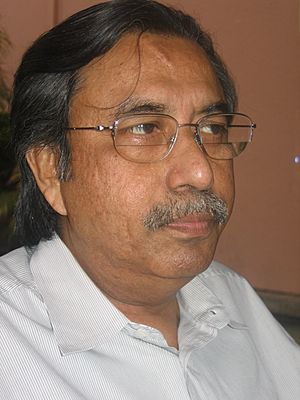Hayat Saif facts for kids
Quick facts for kids
Hayat Saif
|
|
|---|---|

Saif in 2009
|
|
| Native name |
হায়াৎ সাইফ
|
| Born | Saiful Islam Khan 16 December 1942 Dhaka, Bengal Presidency, British India |
| Died | 13 May 2019 (aged 76) Dhaka, Bangladesh |
| Occupation | poet, literary critic |
| Nationality | Bangladeshi |
| Period | 1959–2019 |
| Subject | Love, desolation |
| Notable awards | Bronze Wolf Award (2005) Ekushey Padak (2018) |
| Spouse | Tahmina Islam Laki |
| Children | Three sons |
Saiful Islam Khan (born December 16, 1942 – died May 13, 2019), better known as Hayat Saif, was a famous poet and writer from Bangladesh. He wrote in Bengali and was known for his modern poetry. Besides writing, he also worked for the government for many years. After retiring, he spent his time writing, exploring art, and helping with World Scouting. His poems have even been translated into English and Spanish! Many people in Bangladesh saw him as a smart person who understood modern life and culture very well.
Hayat Saif started using his pen name, Hayat Saif, in 1961 when he began writing for literary magazines. He received the Bronze Wolf Award in 2005, which is a very special award in Scouting. In 2018, he was honored with the Ekushey Padak, a top award in Bangladesh, for his amazing work in language and literature.
Contents
Who Was Hayat Saif?
Hayat Saif was born in Dhaka on December 16, 1942. His parents were Moslem Uddin Khan and Begum Sufia Khan. He loved learning and studied English literature. He earned his master's degree in 1965.
Early Life and Career
After finishing college, Hayat Saif taught at different schools for about three years. Then, in 1968, he joined the Pakistan Superior Service. This meant he worked for the government in the finance department. For over 30 years, he helped manage taxes and government money. He even became the Chairman of the National Board of Revenue before he retired in 1999.
When he was a student in the early 1960s, he also worked as an announcer and newscaster for Radio Pakistan in Dhaka. Later, he worked for Pakistan Television. He always enjoyed broadcasting and even hosted literary shows and talk shows later in his life.
His Amazing Writings
Hayat Saif was one of the most important poets in Bangladesh from the 1960s. He helped create a new style of modern poetry. He wrote many poems and essays.
- He published eight collections of poems.
- He also published two collections of essays.
- Many of his poems and articles appeared in different magazines.
One of his important books of poems is called Pradhānata Māṭi o Mānusha. His collection of essays, Ukti o Upalabdhi, came out in 1992. In 2004, he helped put together a book called A Selection of Contemporary Verse from Bangladesh. His last poetry book, Prodhanoto Smriti ebong Manusher Pathchola (which means "Mainly memories and man's path-walking"), was published in 2009. It had 57 poems that were "woven in a fine thread of thought."
Books in English
Some of Hayat Saif's best poems have been translated into English.
- Voice of Hayat Saif was published in 1998. It has 45 poems translated by different people.
- Another book, Hayat Saif: Selected Poems, came out in 2001. This book also featured poems translated by various writers.
What Was His Poetic Style?
Hayat Saif started writing poetry when he was in eighth grade. His first poems were published in 1962 in a literary magazine called Shomokal. He preferred a specific style of poetry called 'Okkherbritta' or 'Poyer', which is very popular in modern Bengali poems. He often used Bengali words that came from the ancient Sanskrit language.
Hayat Saif and Scouting
Hayat Saif was very involved in the Scouts movement, both in Bangladesh and around the world. He started helping with Scouting in the early 1990s. He was the National Commissioner for Public Relations and Publication for the Bangladesh Scouts. He was also a member of the Asia-Pacific Region Marketing Committee.
In 2005, he received the 305th Bronze Wolf award. This is the only special award given by the World Organization of the Scout Movement for outstanding service to Scouting worldwide. It shows how much he contributed to helping young people through Scouting.
 | Emma Amos |
 | Edward Mitchell Bannister |
 | Larry D. Alexander |
 | Ernie Barnes |

